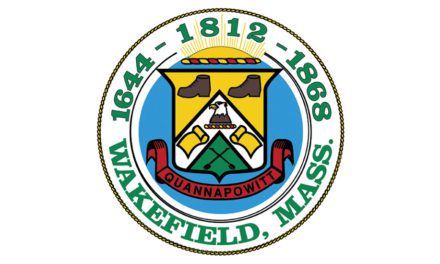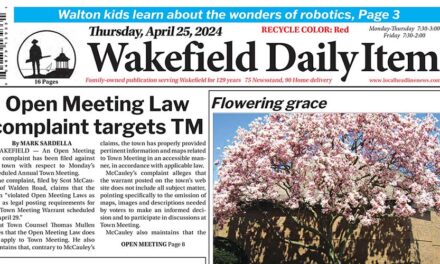Published in the July 27, 2016 edition
By MARK SARDELLA
WAKEFIELD – The town will see a significant bump in state Chapter 70 funds this year, as in its final budget the state legislature increased FY 2017 Chapter 70 funds by $11.7 million for cities and towns combined.
According to a memorandum provided by Pfifferling from the Massachusetts Association of School Business Officials, the statewide budget numbers are likely to hold, as the legislature has the ability to override any vetoes by Gov. Baker with a two-thirds majority.
At last night’s School Committee meeting, School Business Administrator Michael Pfifferling reviewed how the state legislature’s FY 2017 budget will affect education in Wakefield.
Pfifferling said that Wakefield stands to get $5,844,577 in Chapter 70 funding this year, an increase of $443,210 over FY 2016. It’s also about $80,000 more than the amount that the School Department had projected.
The FY 2017 state budget is funding the Special Education Circuit Breaker at $277.3 million, $5.6 million higher the FY 2016 level of $271.7 million, Pfifferling told the School Committee. He said that the state has not yet released the town-by-town reimbursement numbers for the Circuit Breaker but he expects to have them by next month.
Pfifferling reminded the committee that they had level funded the Circuit Breaker reimbursement at last year’s amount of $1.2 million, adding that he was “hoping it comes in a little higher.”
The state budget funds METCO at $20.6 million, $500,000 higher than last year. Pfifferling said that he was not sure how the increase would affect Wakefield, if at all. He said that Wakefield’s METCO program has been doing very well with the budget provided, so it was not a concern.
Pfifferling also highlighted a few other areas of the state budget that impact local education.
He pointed out that the School Choice Sending Tuition assessment charged to Wakefield had jumped from $25,459 to $81,454. He said that he and School Superintendent Dr. Kim Smith did some research and determined that it appeared to be a result of nine or 10 students having enrolled in “virtual schools.”
Pfifferling said that he did not believe that any of those are students who unenrolled from Wakefield Public Schools to enroll in virtual schools. Rather, he said, it appeared that they were children who were being home schooled and using the virtual school to supplement their home schooling.
The Charter School Sending Tuition assessment charged to Wakefield went down, Pfifferling said, from $914,303 last year to $879,837 for FY 2017, a difference of $34,466. The Charter School Reimbursement for Wakefield also went down, he noted, from $159,283 in FY 2016 to $137,883 for FY 2017, a $21,400 reduction. Still, Pfifferling noted it was “net gain.”
School Committee member Christopher Callanan asked about a paragraph in the state budget summary that said that the legislature had cut Kindergarten Expansion Grants out of the budget entirely after previously funding this line item at $18.6 million statewide. It was the largest education-related cut in the FY 2017 budget but the legislature believed that most of the funding had not been going toward the program’s original intent of expanding kindergarten but instead was being used for existing programs.
Pfifferling explained that the cut would not affect Wakefield because Wakefield did not participate in the program this year.




